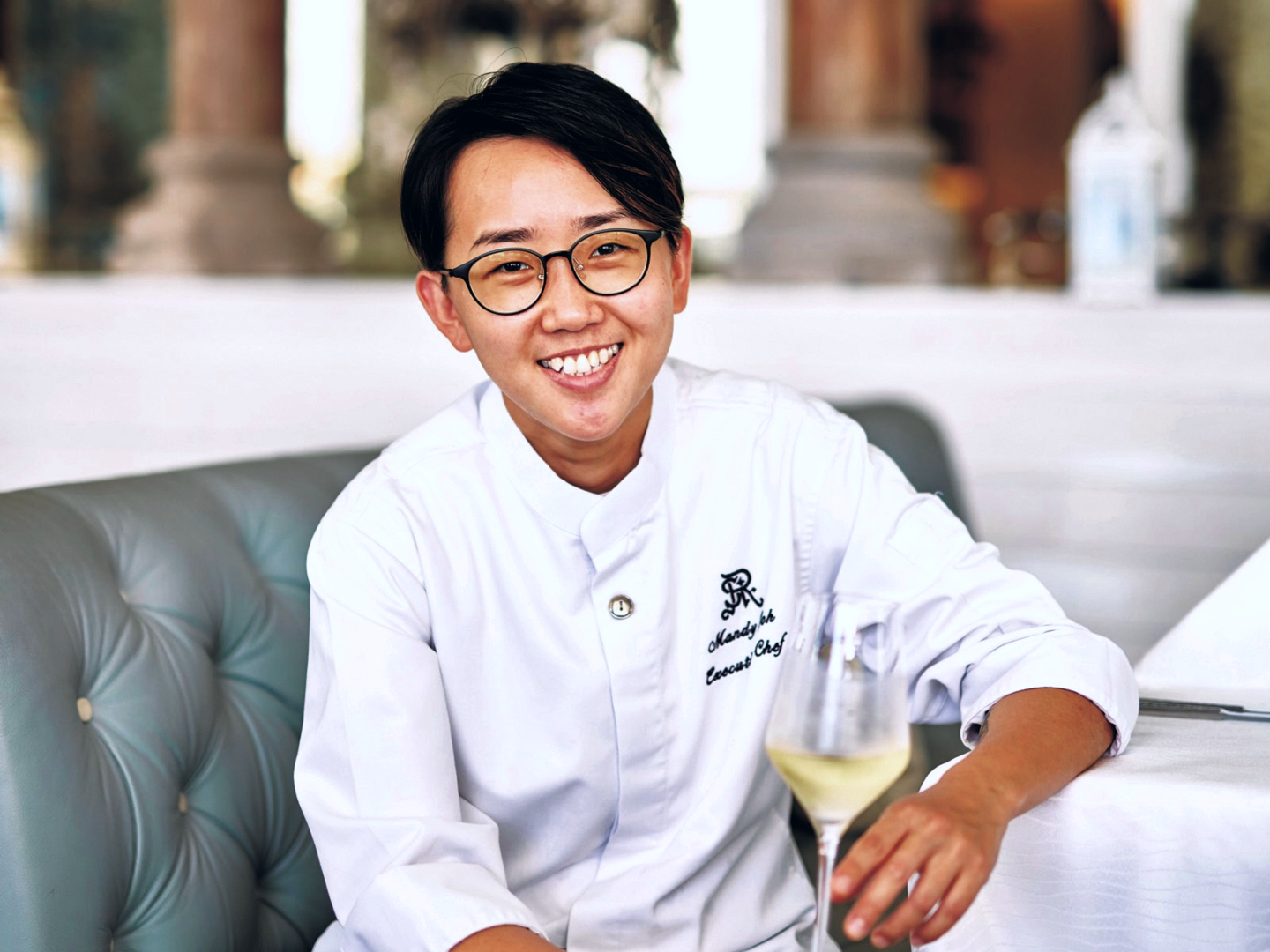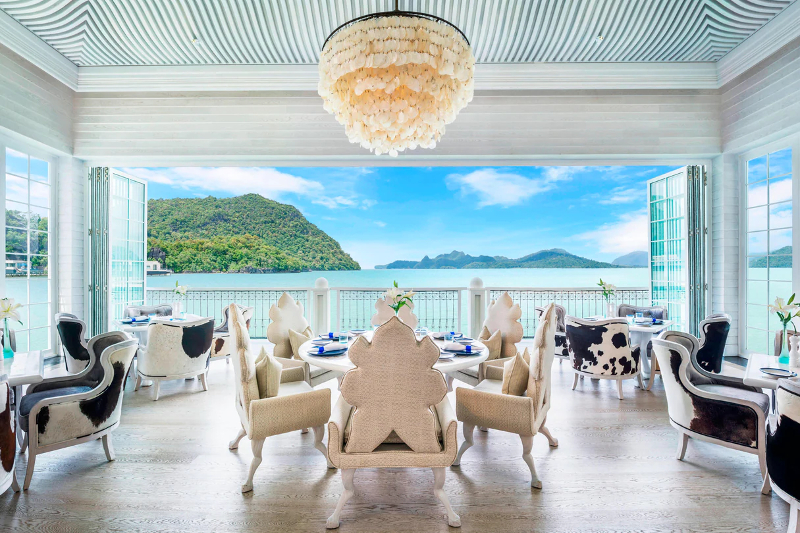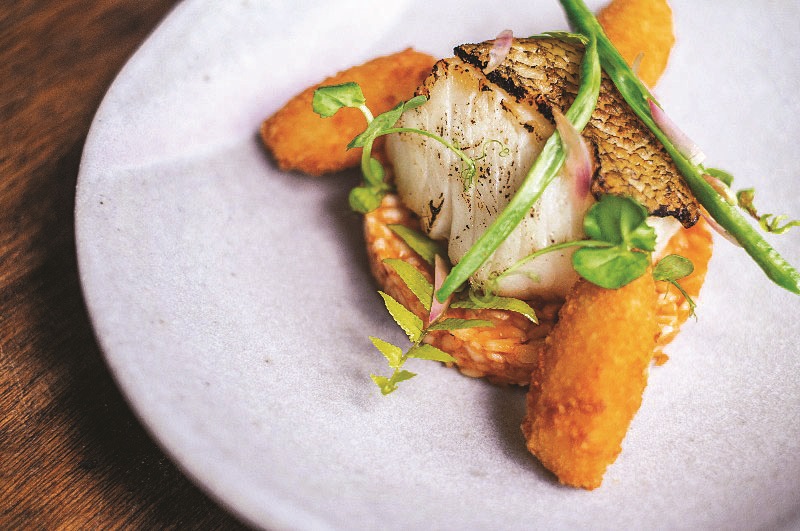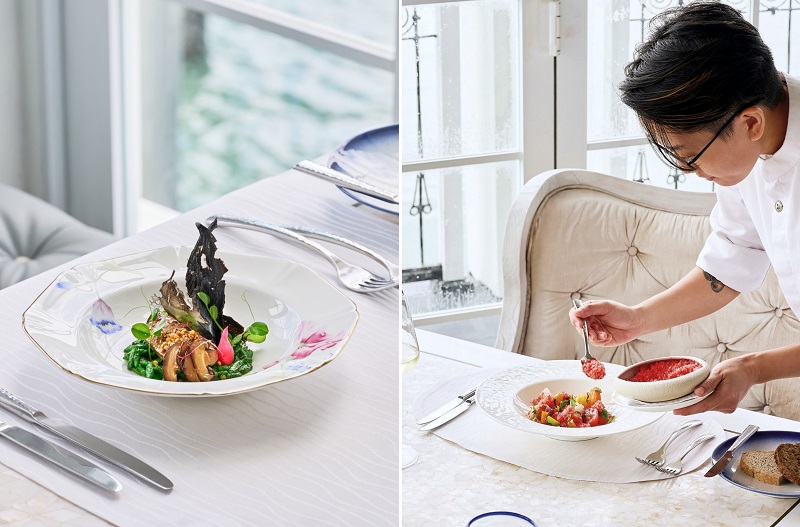
Goh credits her decision to pursue a chef’s career to her participation in the Bocuse d’Or Asia competition (All photos: The St Regis Langkawi)
It is no secret that the culinary world continues to be testosterone-driven. Male chefs have long dominated the global restaurant industry, from the days of the pioneering Marie-Antoine Carême who spearheaded grande cuisine, the wearing of the toque or chef’s hat and even serving each dish in the Russian tradition — according to the menu’s listing — versus the traditional French way of everything at once. Bad boys like the late Anthony Bourdain added to the macho swagger associated with trendy restaurants and the chefs, in turn, achieved rockstar status. Sex, drugs and Roquefort ‘n’ roll? The world could not get enough of it.
However, as the #MeToo movement began to expose sordid revelations, beginning with Hollywood and Harvey Weinstein in 2017, it would appear the hospitality industry too began chucking out its skeletons from the closet not long after. Mario Batali, once the golden boy of the New York dining scene was outed, as was Ken Friedman of celebrity-backed The Spotted Pig in New York’s West Village.
Despite all the horrifying cases and allegations, women chefs bravely continue to carve out their own space in this demanding and relentless profession. The hours are long, the work physically demanding and oftentimes uncomfortable (there is a reason for the proverb, “If you can’t stand the heat, get out of the kitchen”) but perseverance pays off with many women chefs now getting the recognition they deserve.
kayuputi_langkawi.jpg

For Penang-born Mandy Goh Miow Di, 34, success seems to have come relatively early. Appointed executive chef of the seafront St Regis Langkawi in 2019, which comprises 89 suites and over-water villas as well as five F&B outlets, including the swanky Kayuputi restaurant, her career success is the result of nothing but hard graft. And, despite the howls of inequality, Goh graciously states that she feels all chefs, regardless of gender, face the same trials and tribulations. “In a nutshell, it’s the same situation,” she shrugs. “We overcome the same challenges in the kitchen, attend the same meetings and walk the same hallways. The [main difference] is that as a woman it is not as easy to work in the kitchen, from a physical perspective.”
Despite the fact that being a chef remains physically demanding, gone are the days when hopeful young women were instantly relegated to the pastry kitchen upon signing up — a fact Goh acknowledges is very palpable in Malaysia. “When I returned to Malaysia in 2019 after spending many years overseas, I thought [the situation] would be challenging. But it was the opposite. My team has been nothing but supportive and [my experience here] mirrored what I went through overseas. I think it’s the same anywhere in the world.”
Having entered the industry in 2008, the still baby-faced Goh has clocked up stints at a variety of fine establishments, some of which are still thriving. Her first job was as a commis chef at Mandarin Oriental Kuala Lumpur’s Pacifica Grill & Bar before it evolved to become the Mandarin Grill. The Lion City beckoned next, this time taking her to Restaurant Guy Savoy at Marina Bay Sands. Progressively, Goh ventured further away from home, landing positions at the Sheraton Macau, The St Regis Macau and then Mandarin Oriental Pudong’s Fifty 8° Grill, founded by Michelin-starred chef Richard Ekkebus. Working at the latter, she cites, taught her the importance of respect and consistency. “The basics are very important,” she says. “The head chef creates a standard recipe for every dish and we must follow them without excuses or shortcuts. The standard recipe ensures high-quality and consistent meals are produced each and every time.”
mub66hfxjzzh.jpg

She credits her decision to pursue a chef’s career to her participation in the Bocuse d’Or Asia competition. The gastronomic challenge is hailed as the most rigorous of its kind in the culinary world and is traditionally held on a biannual basis in Lyon, France, and takes its name from Paul Bocuse, the celebrated French chef credited with pioneering nouvelle cuisine versus cuisine classique.
“I was proud to be part of the Malaysian team at Bocuse d’Or Asia from 2009 to 2011 as it was the first time an all-female team had won the highly competitive culinary competition,” Goh shares. “It was a tough two years but I enjoyed it very much. Participating in Bocuse d’Or Asia changed me in so many ways, transforming me from someone who had a very playful approach to life to someone with a high sense of discipline. The competition presented an excellent opportunity to widen my skills while adding to my determination to continue my journey in a male-dominated industry. Winning the [Asian chapter of the] championship also inspired me to venture seriously into the culinary world and it remains one of the best and most rewarding experiences of my career.”
Four years ago, the late Jonathan Gold, food critic for the Los Angeles Times had referred to a global best restaurant list’s creation of a World’s Best Female Chef category as an “unlovable honour”. His comment polarised the industry. While some hailed it as a positive step towards greater inclusivity and acceptance, others slammed it as being patronising or tokenism. Goh, taking the less combative stance, diplomatically comments: “We women should take this commendation as a motivation tool for more women to become chefs.”
Despite acknowledging there is much room for improvement, Goh states what is more important is changing the overall mindset of people. “It’s still a common perception that people think a woman should be the primary caregiver or nurturer when it comes to family and children,” she muses. “I have been blessed to have had the opportunity to work with many successful female chefs in my younger days but many of them still chose to ‘retire’ from being a chef after getting married. News like that makes me sad … which makes it one of the reasons I choose to remain single.”
kayuputi_st_regis_langkawi_chef_mandy_goh.jpg

Goh also cannot stress enough how change needs to start with the individual. “If we want to transform this perception that a chef’s life is a male-dominated world, we must start with ourselves. In my opinion, those of us in the industry need to take on challenges and stretch our potential. Until then, we will not know what we are truly capable of and what lies in store for us.”
Interestingly, Goh names three men as her main role models: the first, renowned Danish chef and restaurateur Rasmus Kofoed, who incidentally took home the top honours at the 2011 Bocuse d’Or. “He won bronze and silver in 2005 and 2007 respectively,” says Goh of the head chef and co-owner of the three Michelin-starred Geranium restaurant in Copenhagen. The second is a name most Malaysian veterans of the industry would recognise: David King, The Westin Kuala Lumpur’s former director of kitchens. “David was my director of culinary at the Sheraton and St Regis in Macau. He was also my adviser throughout the Bocuse d’Or. I must also name Marcel Kofler, my executive chef when I was with the Mandarin Oriental Kuala Lumpur and Bocuse d’Or coach.”
While achieving equality will be a journey of incremental progress, Goh does not forget to focus on the primary and almost primal pleasure her industry gives the world: the joy of good food and drink. “I love exploring local restaurants and coffee shops,” she shares. “I enjoy everything local. Having said that, I also love a sushi meal as it is prepared à la minute to ensure the temperature of the rice is in perfect balance with the freshness of the sashimi. That is why I salute Japanese chefs who pay so much respect to the ingredients they use in the food they serve.”
It is no secret that for a cuisine whose foundation is rice, seaweed and raw ingredients, training to be an itamae-san or sushi chef takes easily over a decade, with several years spent first at the very bottom, as a cleaner, and then sushi rice-maker, before progressing to an apprentice wakiita, a term that denotes someone who is allowed “near the cutting board”. Only then can one earn their own set of hocho or sushi knives. Acknowledging the years of mastery needed in order to attain coveted shokunin status, Goh smiles and says, “But it is worth every bite.”
This article first appeared on Mar 7, 2022 in The Edge Malaysia.


